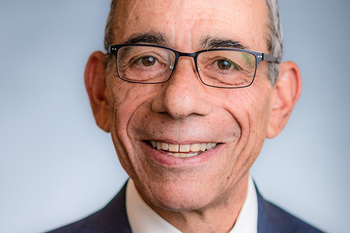Breast Cancer in Men Overview
Learn About Breast Cancer in Men
View Main Condition: Breast Cancer
Breast cancer is cancer that starts in breast tissue. Both males and females have breast tissue. This means that anyone, including men and boys, can develop breast cancer.
Breast cancer in men is rare. Male breast cancer accounts for less than 1% of all breast cancers.
Infiltrating ductal carcinoma - male; Ductal carcinoma in situ - male; Intraductal carcinoma - male; Inflammatory breast cancer - male; Paget disease of the nipple - male; Breast cancer - male
The cause of breast cancer in men is not clear. But there are risk factors that make breast cancer more likely in men:
- Exposure to radiation
- Higher estrogen levels due to factors such as heavy alcohol use, cirrhosis, and obesity
- Heredity, such as a family history of breast cancer, having a variant BRCA1 or BRCA2 gene, and certain genetic disorders, such as Klinefelter syndrome
- Excess breast tissue (gynecomastia)
- Older age -- men are often diagnosed with breast cancer between ages 60 and 70
Symptoms of breast cancer in men include:
- Lump or swelling in the breast tissue. One breast may be larger than the other.
- A small lump beneath the nipple.
- Unusual changes in the nipple or skin around the nipple such as redness, scaling, or puckering.
- Nipple discharge.
Treatment options for breast cancer in men include:
- Surgery to remove the breast, lymph nodes under the arm, the lining over chest muscles, and chest muscles, if needed
- Radiation therapy after surgery to kill any remaining cancer cells and to target specific tumors
- Chemotherapy to kill cancer cells that have spread to other parts of the body or to lower the risk of the cancer returning after surgery
- Hormone therapy to block hormones that may help certain types of breast cancer grow
During and after treatment, your provider may ask you to have more tests. This may include a repeat of tests you had to make the diagnosis.
Yale University
Eric Winer is an Oncologist and a Hematologist Oncology provider in New Haven, Connecticut. Dr. Winer is rated as an Elite provider by MediFind in the treatment of Breast Cancer in Men. His top areas of expertise are Breast Cancer, Triple-Negative Breast Cancer, HER-2 Positive Breast Cancer, and Breast Cancer in Men.
ASST Settelaghi
Paolo Radice practices in Varese, Italy. Mr. Radice is rated as an Elite expert by MediFind in the treatment of Breast Cancer in Men. His top areas of expertise are Breast Cancer in Men, Breast Cancer, Ovarian Cancer, Wilms Tumor, and Vitrectomy.
Mayo Clinic
Kathryn Ruddy is a Hematologist and an Oncologist in Rochester, Minnesota. Dr. Ruddy is rated as an Elite provider by MediFind in the treatment of Breast Cancer in Men. Her top areas of expertise are Breast Cancer, Breast Cancer in Men, Paget Disease of the Breast, Hormone Replacement Therapy (HRT), and Salpingo-Oophorectomy.
Cancer affects how you feel about yourself and your life. You can ease the stress of illness by joining a cancer support group. Sharing with others who have had the same experiences and problems can help you feel less alone. The group can also point you to helpful resources for managing your condition.
Ask your provider to help you find a support group of men who have been diagnosed with breast cancer.
The long-term outlook for men with breast cancer is excellent when the cancer is found and treated early.
- About 91% of men treated before the cancer has spread to other areas of the body are cancer-free after 5 years.
- Almost 3 out of 4 men treated for cancer that has spread to lymph nodes but not to other areas of the body are cancer-free at 5 years.
- Men who have cancer that has spread to distant parts of the body have a smaller chance of long-term survival.
Complications include side effects from surgery, radiation, and chemotherapy.
Contact your provider right away if you notice something unusual about your breast, including any lumps, skin changes, or discharge.
There is no clear way to prevent breast cancer in men. The best way to protect yourself is to:
- Know that men can develop breast cancer
- Know your risk factors and talk with your provider about screening and early detection with tests if needed
- Know the possible signs of breast cancer
- Tell your provider if you notice any changes in your breast
Summary: This study is being done to create a resource of samples and information that can be used to improve our understanding of the development, progression and treatment of recurrent or metastatic breast cancer or male breast cancer.
Summary: This study compares the experiences of people who receive information about genetic testing from a computer-generated character to patients who receive information from a human genetics healthcare provider. Patients with cancer are increasingly recommended for genetic testing as standard of care. Multiple factors contribute to low usage of genetic testing but for many patients the lack of access t...
Published Date: August 21, 2024
Published By: Warren Brenner, MD, Oncologist, Lynn Cancer Institute, Boca Raton, FL. Review provided by VeriMed Healthcare Network. Also reviewed by David C. Dugdale, MD, Medical Director, Brenda Conaway, Editorial Director, and the A.D.A.M. Editorial team.
Farr DE, Gradishar WJ. Male breast cancer. In: Klimberg VS, Gradishar WJ, Bland KI, Korourian S, White J, Copeland EM, eds. Bland and Copeland's The Breast. 6th ed. Philadelphia, PA: Elsevier; 2024:chap 67.
Kimberg VS, Hunt KL. Diseases of the breast. In: Townsend CM Jr, Beauchamp RD, Evers BM, Mattox KL, eds. Sabiston Textbook of Surgery. 21st ed. St Louis, MO: Elsevier; 2022:chap 35.
National Cancer Institute website. Male breast cancer treatment (PDQ) - health professional version. www.cancer.gov/types/breast/hp/male-breast-treatment-pdq. Updated January 31, 2024. Accessed August 28, 2024.

The Male Breast Cancer Coalition exists to support and advocate for men diagnosed with breast cancer.

